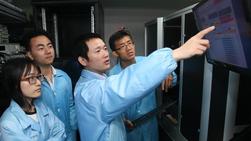 In this file photo dated May 15, 2018, Jin Xianmin (2nd right), a quantum communication researcher with Shanghai Jiaotong University, instructs students in making photonic quantum chip in Shanghai, east China. (PHOTO / XINHUA)
In this file photo dated May 15, 2018, Jin Xianmin (2nd right), a quantum communication researcher with Shanghai Jiaotong University, instructs students in making photonic quantum chip in Shanghai, east China. (PHOTO / XINHUA)
BEIJING — Chinese researchers have developed a vacuum storage cabinet to keep quantum chips "fresh," and used it in the country's first quantum chip production line, according to a Science and Technology Daily report.
The researchers from Origin Quantum Computing Technology Co., Ltd. in east China's Anhui province used high-vacuum storage technology to develop the storage cabinet that can provide an ideal storage environment for quantum chips to maintain their computing capability.
Quantum chips can't be used if they are not properly stored. The storage cabinet can provide a high-vacuum environment for them, just like a fridge can keep food fresh
"The superconducting material in quantum chips is highly sensitive to the environment and easily reacts with oxygen and water in the air, just as food is oxidized and decays when exposed to air," said Jia Zhilong, head of the chip R&D team of Origin Quantum.
READ MORE: Anhui tech startup eyes quantum computing revolution
"Quantum chips can't be used if they are not properly stored. The storage cabinet can provide a high-vacuum environment for them, just like a fridge can keep food fresh," added Jia, who is also vice director of the Quantum Computing Engineering Research Center of Anhui Province.
Quantum chips are the core components of quantum computers. Unlike traditional chips, quantum chips need to go through complex production processes. Some factors such as environment temperature, noise, vibration, electromagnetic waves, and small contamination particles, can affect such processes.
READ MORE: Quantum computer control system launched in east China
According to Jia, if the storage environment during or after the production processes is not up to the required standards, the superconducting quantum chip will adsorb various impurities, and their key components will age, resulting in poor frequency consistency of qubits, reduced coherence time, and deteriorated performance


